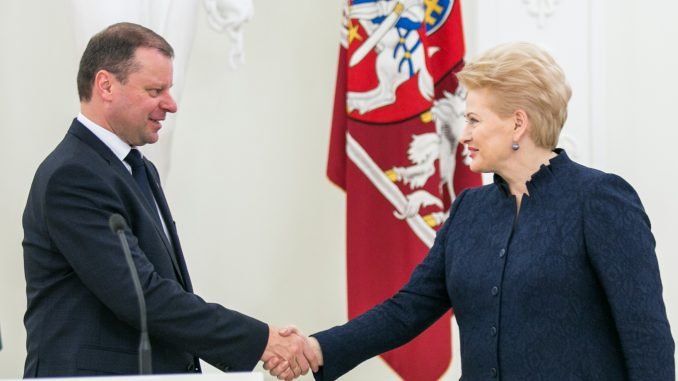
In an exclusive interview to TV3, President Dalia Grybauskaitė revealed how the new ministers were appointed. The President also responded warmly about the new Seimas and cabinet and asked people to be understanding to the newcomers. Interview excerpt:
– How did you celebrate Christmas? The holiday period recently passed and New Year’s Eve still awaits.
We are right in the middle of the holiday period, Christmas just passed and I hope that all of our people managed to spend time among their relatives and close ones, to find something good under the Christmas tree. I celebrated practically the same as always, same as everyone else – with my relatives.
– Let’s move to politics. You recently met with the ministerial cabinet, all the ministers. What do you think, will they work well, will they manage to work until the end of term? There were many cases last term where this did not occur. How do you think the new cabinet will do?
There are probably many objective and subjective reasons, which will have a specific impact on the work of the cabinet. Of the more objective – the majority of them are very young and new, new faces in politics, many non-partisan professionals in the cabinet, many newcomers to politics in the Seimas. The first period is self-identification, the discovery of new mutual relations, discovering common forms of work. It will be a difficult and risky time, but it is an excellent opportunity for everyone – both the newcomers in politics in general and the newcomers to cabinet – to become real politicians and earn experience. I always hope for the best, how things will go – time will tell.
– The representatives of the Peasant and Greens Union declare that this is the first professional cabinet. What do you think, how will these professionals work, will they truly be better than the ministers of the Social Democrat or Conservative governments?
I cannot compare this way. We have a unique situation, I would even say an experiment, when the cabinet is mostly comprised of non-partisan experts of their topics, but we know that the position of minister is already a political position. Will the professionals manage to become politicians and combine their knowledge with the capacity to reach results – that which we always expect from politicians – will they manage to find common ground with Seimas? Only time will tell, but this is an excellent opportunity for the professionals to grow and become real politicians. It is truly hard to guess for now, so I can only wish that both the cabinet and Seimas would manage to find ways to reach the need results.
– Speaking of common ground, it appears that the new cabinet members are easily finding that with you and with the new majority, you have not really “rejected” a single minister. What decided this – were the candidates very suitable?
I think that it was everything – the candidates were not bad and similarly to the PM, I also have to admit that prior to announcing the names, consultations between the PM, me and the majority were done. The goodwill and respect between institutions decided that the cabinet was fairly smoothly selected, except one position. There were no premature antagonisms and no attempts to publicise names, impose them, perform public pressure – it was a truly good spirited relation, discussions prior to making decisions and this ensured the cabinet was appointed smoothly.
– We’ve heard various proposals from the new members of Seimas and new coalition – some controversial, some not. For example various proposals for how the budget should be arranged, later on the change of heart on heating cost exemptions, proposals on cryogenic ovum storage. How do you view those proposals? Is it not correct that the Seimas is rather undecided?
It is also explainable because this is just the start. What is most important is that there is much will, but the knowledge to accomplish things is insufficient – there is a lack of institutional memory, but it will appear. I am viewing it leniently for now. What is most important for me is that there would be a will to change things – particularly that which needs changing and if they see that they made a mistake, they manage to admit that ok, they are changing their opinion. God forbid if there was a stubbornness to bulldoze through mistakes and not hear that it is a mistake, to continue with it. We shouldn’t rush to blame or criticise. If mistakes are made, but they manage to say that “Ok, we hear the criticism, arguments and we can change our mind, we are unafraid and unperturbed because we can change our opinion.”
This is truly a time of testing, the very beginning, but what is achieved in the finale, particularly with the Civil Code, which I had to veto, to draw back and later vote differently – I believe there have been no major mistakes yet. There are efforts to make changes, do things, particularly with alcohol and its consumption. There are good intentions and certain things are definitely going to be done, thus I invite to leave space for the newcomers – not to suppress them, the way we like to with criticism and all that publicity… They are not yet accustomed to reacting to it, unaccustomed with such an environment, but they will learn, same way as we all did.

Be the first to comment